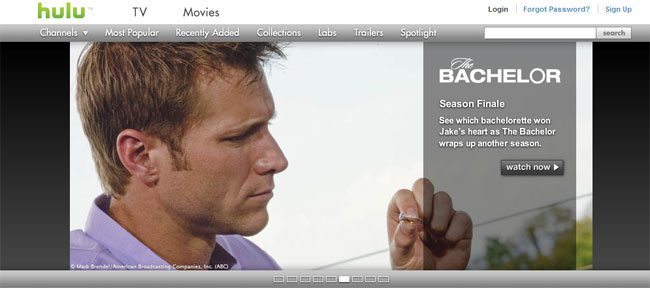 Hulu’s days as a free online video site could be ending soon.
Hulu’s days as a free online video site could be ending soon.
Comedy Central’s decision to yank two of the most popular shows on Hulu — “The Daily Show” and “The Colbert Report” — in a dispute over splitting ad revenue is the latest blow to the entertainment industry’s attempts to make money off ads that run with free video.
Yet Hulu’s most viable alternative — charging for access to some videos — could turn off viewers and crimp the site’s explosive growth. Ultimately, the remedy to Hulu’s current dilemma could leave the site even worse off, a poor shadow of its former self.
Many viewers are drawn to Hulu because of its ease of use, not because they couldn’t get much of the same content elsewhere. Hulu’s videos simply aren’t exclusive enough — compared with, say, Time Warner Inc.’s premium HBO cable channel.
If Hulu charges for a TV show or movie, the viewer could simply watch it over the air live, be more consistent about recording it to view later or catch the program for free through a video-on-demand service offered by cable TV and other providers.
“There are very few people who would be willing to pay for it,” said Bruce Leichtman, president of the Leichtman Research Group Inc. in Durham, N.H.
He noted that viewers could simply ask themselves, “Why would I pay for it when I can get it on video on demand?”
Chase Carey, chief operating officer of Hulu co-owner News Corp., has said that the site would have to start charging for some video eventually, though he and other officials have been mum about when that would happen and what aspects would remain free.
Hulu has had trouble turning a profit because it doesn’t pull in enough revenue to pay for operations. Online ads simply don’t generate as much revenue as broadcast TV commercials.
In the latest blow, Hulu disclosed in a blog this week that Comedy Central would yank its shows from the site beginning next Wednesday.
Comedy Central and Hulu couldn’t come to terms on how to share ad revenue, according to two people with knowledge of the discussions, speaking on condition of anonymity because they were not authorized to comment on private talks.
“The Daily Show” and “The Colbert Report” will still be available on sites run by Comedy Central, letting the Viacom Inc. network reap all of the ad revenue. About a half dozen other Comedy Central shows will also leave Hulu.
Given that “The Daily Show” is the third most popular show on Hulu, Viacom’s exit is a big blow to the experiment by the entertainment companies that own it — News Corp., Walt Disney Co. and General Electric Co.’s NBC Universal — to see whether they can successfully make money off ads and bypass cable and satellite TV companies.
Traffic will likely take a hit as Comedy Central fans leave the site, and Comedy Central proves with its departure that it doesn’t need Hulu to bring in online traffic and revenue.
The next step in the Hulu experiment will be to decide what and how much to charge.
But a Leichtman survey, released Tuesday, found that 81 percent “strongly disagree” with the notion of paying $9.95 a month for a service like Hulu, while only 5 percent “strongly agree” to pay.
For Hulu to successfully charge fees, whether monthly or on a per-video basis, it would have to offer exclusive or premium content that viewers couldn’t easily get elsewhere.
Its owners certainly have a wealth of content to unleash — but that would upset the cable TV, satellite and phone companies that offer video. These operators pay Hulu’s owners fees to carry their cable channels and increasingly even local, over-the-air TV stations.
Content providers have had mixed success charging extra for video. HBO, CBS Corp.’s Showtime and Liberty Media Corp.’s Starz are able to charge a monthly fee on top of what viewers already pay their cable TV, satellite and phone companies. But others, such as the Disney Channel, have to be satisfied with staying on basic cable lineups.
If Hulu started charging, it would certainly crimp its growth. In December, less than three years since its launch in March 2007, Hulu delivered more than a billion videos, according to Web traffic measurement firm comScore Inc.
Regardless of whether Hulu charges, traffic would likely take a hit as more shows from cable channels become available for free online to customers of cable TV and other subscription services. Comcast Corp. began offering content from about two dozen channels online in December. Time Warner Cable Inc., DirecTV Inc. and Verizon Communications Inc. are following suit.
Hulu is essentially left without many options.
One scenario is for Hulu to merge free and paid content on its site. It could make the premium content available for a monthly subscription fee with options to rent or purchase shows a la carte, said Tony Wible, an analyst at Janney Montgomery Scott. Hulu will probably continue to have ads as well.
A fee-based Hulu could come with better content. Currently, Hulu carries TV shows that air for free on the broadcast networks, as well as some cable shows, older movies, clips and movie trailers. But if Hulu starts to charge, newer movies could hit the site.
However, the paid-video market is already crowded with rivals such as Apple Inc.’s iTunes, Amazon.com Inc.’s Unbox and Netflix Inc.’s online delivery of movies.
Hulu has to be different — and that’s not an easy task.


